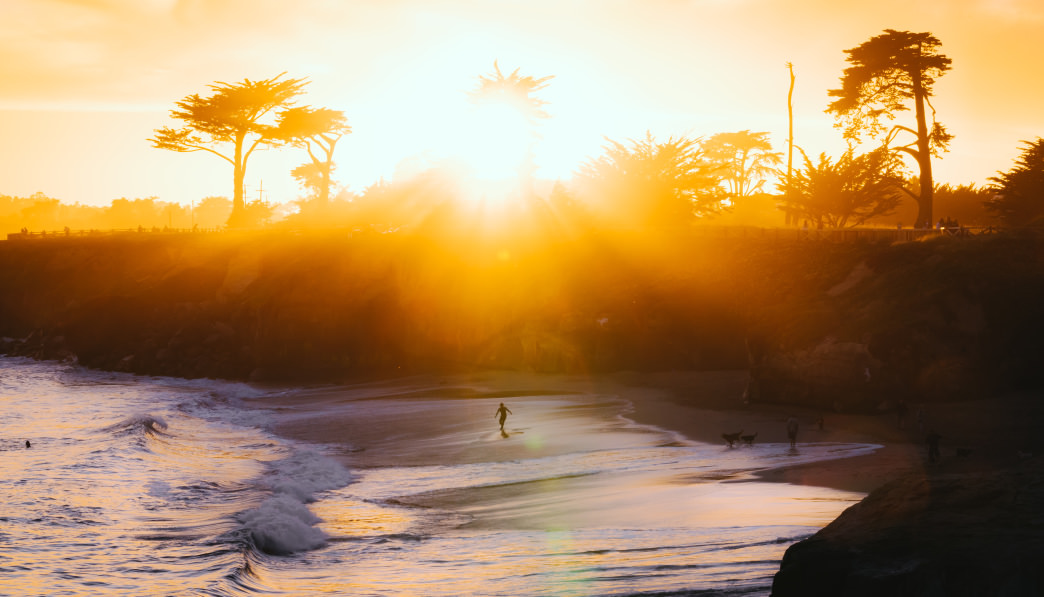Anyone active in the outdoors community around Chattanooga has likely heard of Randy Wharton. The founder of Chattanooga-based nonprofit Wild Trails is also an ultramarathon trail runner, long-distance paddleboarder, and lifelong outdoor adventure seeker.
His love of nature is a given, but Wharton offers some extreme descriptions for his passion for the outdoors and the lifestyle he’s created around it, which he calls "radical health."
"When you’re in this kind of shape there isn’t really a day where you couldn’t wake up and go run 30 miles," he says. “I do this stuff every day, [but] not because I want to stay healthy. It’s kind of like when somebody has gotten addicted to heroin. Certain addictions are just impossible to break, and [addiction to nature] is just like that. It’s hard for somebody who has never experienced radical health to know how it feels.”
"There’s a connection with nature that’s such a huge part of the experience," Wharton adds. “I’m certain there’s no way it would be the same if I ran 10 miles on city streets. There’s an energy that’s out there in nature that you just don’t get when you’re in the city. It’s an amazing feeling.”
While not everyone can run 30 miles at any given moment like Wharton, most outdoor enthusiasts can relate to the mental and physical connection to, or even craving for, nature. And it turns out, there’s a name for it: biophilia.
As our increasingly urbanized cultures across the globe become more stressed out, depressed, and addicted to technology, more and more scientific studies are making correlations between nature exposure and benefits to both physical and emotional health. And when we lose our nature fix, we often feel crummy or crabby.
If this sounds familiar, here’s a handy set of reference questions to ask yourself and find out—are you addicted to nature?
If you find yourself more stressed out if you don’t get your trail time … you might be addicted to nature.

Jeff Bartlett
"Even after just 15 minutes of being outside, our brains and bodies start to respond [and] people experience a boost in well being," says journalist Florence Williams, who has written extensively about the science behind nature’s benefits. “Our blood pressure goes down, our heart rate variability changes in a way that’s more resilient to stress, and our cortisol levels—our stress hormones—can decrease.”
This de-stressing is attributed to factors beyond the positive effects of exercise. Consider a study in which researchers in Japan sent groups of people to walk in the forest and other groups to walk in the city, and measured the effects on both. The nature walkers had markedly higher positive benefits and lowered stress levels than the city walkers, leading researchers to theorize that it was the immersion in nature that led to the benefits. So if you’re feeling stressed out, you may just need some nature in your system to chill.
If you find yourself feeling depressed after being stuck inside all week … you might be addicted to nature.

Mitchel Jones
While working on her recent book, _The Nature Fix: Why Nature Makes Us Happier, Healthier, and More Creativ_e, Williams spent time with researchers in Finland whose studies showed that people who spend at least five hours a month in nature are able to better resist and ward off mild depression. According to the researchers, that’s the recommended monthly minimum for maintaining emotional health, but more is generally better.
"Nature benefits exist on a dose curve," Williams explains. “So the benefits depend on how much nature you have.”
"Five hours a month isn’t very much in my book," she adds. “I need to go out every day, so I think there’s some individual variability.”
In other words, if you’re in the "addicted to nature" category, you likely need to get outside more to stay emotionally healthy.
If your creativity and focus plummet if you haven’t been breathing clean outside air … you might be addicted to nature.

Mitchel Jones
Yep, nature makes you more creative too. In studies by psychologists from the Universities of Kansas and Utah, students who spent several days hiking and camping in the wilderness performed 50 percent better on tests measuring their creativity than when they took the same tests before spending time outdoors. Other studies showed boosts in memory, cognition, and focus after connecting with nature, whether that meant walking outdoors or simply looking out the window.
Add to that hundreds of years of anecdotal evidence and stories from the great scientists, writers, and artists of history—many of whom claimed that their best ideas came to them during a walk in the woods—and you’ve got a great recipe for sparking creativity: Get outside.
If you find yourself more selfish, self-absorbed, and generally crabby when you haven’t seen a sunset in weeks … you might be addicted to nature.

Mitchel Jones
There’s a lot of new research looking into the power of awe: that powerful feeling you get while, say, soaking up a stunning sunset. It turns out that experiencing awe-inspiring natural beauty actually makes us better people.
"Imagine looking up at the Milky Way, or looking at an incredible waterfall, or seeing a moose in the woods. We have this sense of awe that makes us—our egos—feel smaller," Williams explains. “We tend to view our own personal problems as being less significant, and then we feel more connected to each other and the power of the universe.”
Researchers are finding that the more people experience awe, and the perspective of feeling smaller but still connected to something bigger and more significant than themselves, the better their emotional health.
"Nature and wilderness are critical for civilization," Williams adds. “It really does make us more community-minded, it makes us look out for each other, and it makes us better people. Even if we live in a city, it’s still important to seek out those moments of awe and beauty. You can find it in a sunset, a bird flying overhead, or the rivers in your town. Cultivating that awe is something you have to learn how to do.”
If ** you get antsy if you’re not regularly running 30 miles, paddling Class V’s, or shredding trails on your bike … ***you might be addicted to nature (and, maybe, adrenaline too).*
While nature plays a big role, when it comes to high-octane adventure sports or extreme physical activity, you’re probably also addicted to some combination of adrenaline, dopamine, and endorphins.
"When you start thinking about adventure sports, that’s kind of a different brain network that kicks in," Williams says. “Then you’re talking about a dopamine dependency, where you do need a big hit of dopamine that you can only get from a certain level of adventure sports. I think that nature is a part of that, but I don’t think that it’s the whole picture.”
Put another way, you don’t have to be bombing down a mountain at 40 miles an hour to appreciate nature or reap the benefits of being in it.
"We all have different tolerances for nature and different types of nature that we prefer," Williams says. “Some of us might feel great looking at the ocean, and others of us are freaked out by how wide open it is. We need to pay attention to how we feel when we’re outside, how we feel in different kinds of nature immersion settings. Some people are going to be on that side of the bell curve where they may need a big bang and they may also need the adrenaline rush of the sport.”
So you’re addicted to nature. What now?

Mitchel Jones
Embrace it, and be grateful it’s a healthy addiction: Nature is the cure, not the disease.
"I think that addiction to nature is sort of our default state," Williams notes. “I think we’re all supposed to be addicted to nature because that’s how [our ancestors] survived—they needed to totally understand and feel connected to the natural world.”
According to experts, the real problem is not that some of us are addicted to nature, but that so many of us aren’t. Increasingly, people whose lives play out almost entirely in urban environments are addicted to technology and disconnected from nature—and so much is lost in that imbalance. And it’s not just the obvious effects like weight gain: We lose the peace that comes with a walk in the woods, the creativity sparked by a run on a trail, the thrill of testing your limits on a crag or a river, and the wonder of looking up at a clear sky full of stars.
The negative effects we feel when we don’t get our nature "fix"—depression, stress, selfishness, or lack of focus—are all really just indicators that we’re missing something that is inextricably tied up in the core of who we are, not just as outdoor enthusiasts or adrenaline junkies and everyone in between. Nature also connects us to something far more primal and long-lasting: who we are as humans.
"We are natural beings, and we have to interact with other natural beings, not just human beings," Wharton says. “There’s something out there in nature. I used to run a lot faster, but since I slowed down, I see more. There’s an interaction with nature that happens that we just need.”
Originally written by RootsRated.
Featured image provided by Mitchel Jones

 Science is increasingly showing a correlation between well-being and being outside.
Science is increasingly showing a correlation between well-being and being outside.